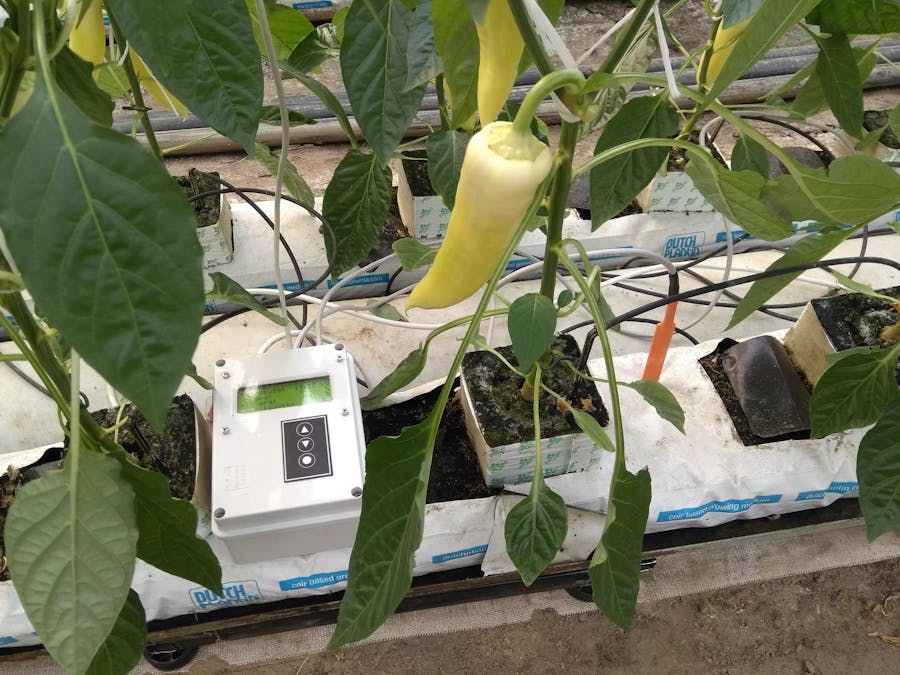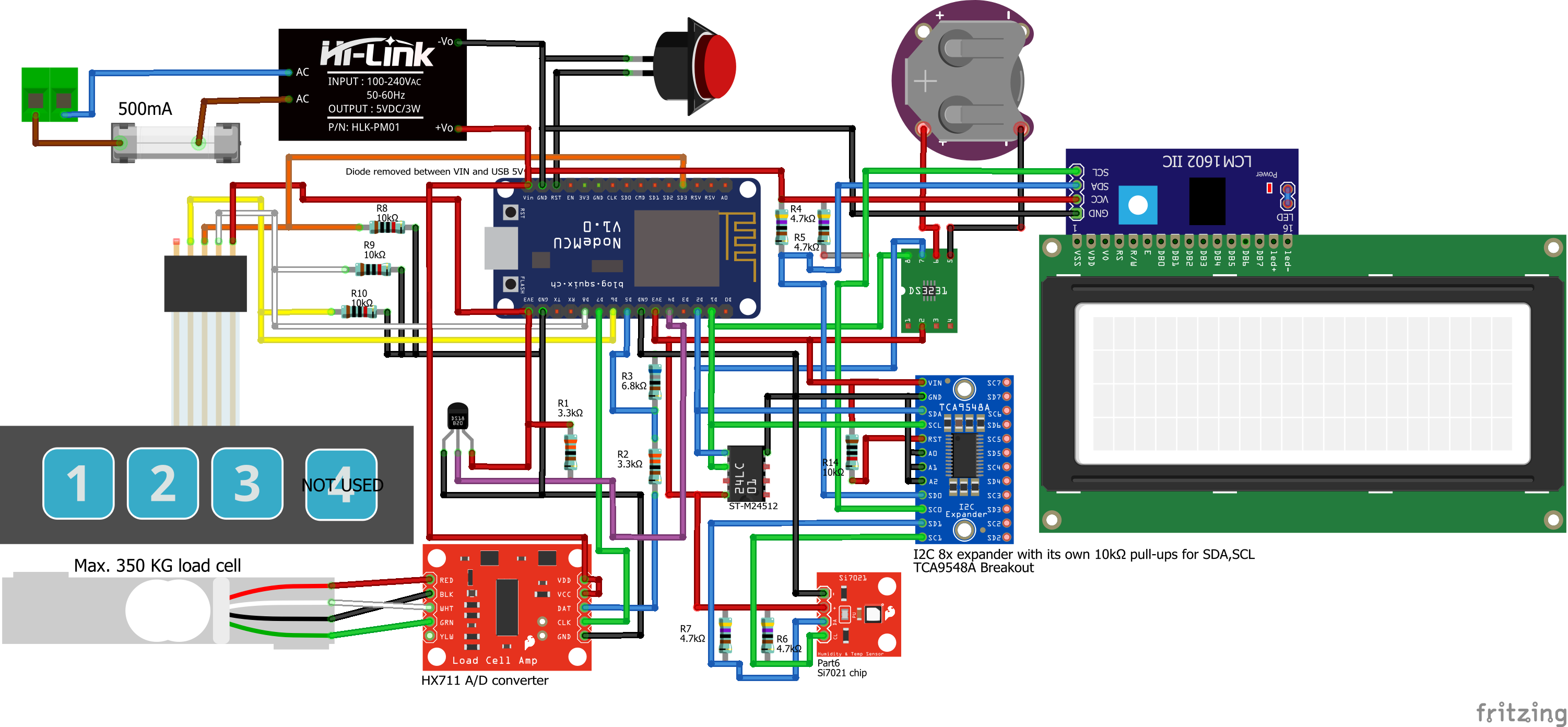As promised before, to follow the Cube Series for Greenhouse (Climate Cube, Alarm Cube, IoT Cube), it is time to measure the amount of water during irrigation using the Weight Cube for Greenhouse.
Be advised that in this project deep details are going to be reached.
Why is precise irrigation so important?From that point when you leave behind the well known 'ancient' soil and switch to some kind of growing medium (coir, rock wool etc. based substrates) you just simply limit the space for roots and for plants. In the real soil there are endless space for roots to grow, however this (our) overwhelmed soil is no more available to grow anything economically. Meanwhile in the substrate, there are near perfect conditions/start for plants and a well known volume of space like 24 litres of growing medium for 6 individual plants.
So why is it still a must to change the process of growing vegetable in a greenhouse using growing mediums even if you built your own limits? Because you build a constant greenhouse having early harvest just to gain more income. More income needed to cover the continuously increase in costs and eventually this is how things work. We simply adapt to the changes of 'how things work'. Yesterday it was real soil, today it is coir, tomorrow it will be... if will be.
But back to the question. Using substrates you face with new rules and well determined limits on how to produce paprika (sweet pepper). You have to give the optimal conditions required by the plants. For example paprika,
- likes when the substrate have 60-80% water content
- likes when the average daily temperature around 25 Celcius degree
- likes the average 25 degree when there is no more irradiation per day than what the plant can use
- and likes this:
It shows the theory of optimal irrigation method during a day where everything else goes as expected.
A deeper explanation: keeping things between the optimal percent of soil water content (WC, which is differ for different mediums) if the last irrigation point meant let's say 72% of WC, then from that point the water content should drop about 8 values to 64% (which called phase 3), and this 64% point will be the first irrigation point of the day, and the start of phase 1. The phase 1 is the process of re-saturating the medium. The P1 interval lasts until the required drain water flows out from the growing medium. In the phase 2 interval you have to irrigate when WC drops 2-3% percent then you irrigate back what consumed. The phase 2 stops when you assume that from that point to start point the medium will lose 8% of WC.
The whole irrigation idea may looks like a closed loop but practically you have to make a basis point of the optimum. This base point mostly based on your experience and the environment. You know the actual season, the average daily temperature, the daily amount of irradiation, the growing state of the plants etc. Or to get exact values you may use a WC sensor designed and developed for the growing medium you use. There are many types around the market but for us (for coir) this one LINK can give the most reliable infos. It costs thousands of dollars and precise. Okay but what if you want to use it continuously, several places and like a real online (IoT) thing and later use those infos to make irrigation automatically? You spend more more and even more. Build glasshouses on several hectares, drill your own thermal well, and above and beyond.
... but let's not have too many irons in the fire!
Focusing on the solution to reach optimal irrigation method using available resources we should try to use the correlation between optimal WC of substrate and the weight of the actual medium.
First, if you choose/measure/prognose the optimal WC of substrate and you get the 64% water content value, for example, then measure the actual weight of the medium getting 22.31 kilos, again for example. Now you do the maths. If 22.31 is the optimal weight, then 1% of change equals to 223 grams.
I don't think I have to continue explanation.
Finally do something after theory revealedIn summary, my Weight Cube for Greenhouse do the followings:
- measures the weight of the medium
- logs all data to thinsgspeak (later Google Cloud Platform) every 6 minutes
- measures RH% / Air temperature at the top of the plants
- measures substrate/root temperature
- measures WC % using this sensor LINK
- displays values on LCD (WC % changes compared to user set hours) to the grower
- saves data of the last 24 hours to EEPROM using unique 6 minutes period IDs
- some stuff under test/development
First the schematics have been made:
I think the whole assembling process took 30-40 hours. But a huge improvement achieved after the second and third piece of Weight Cube! I have made 3 pieces with slight differences. So, don't be confused if you see differences on pictures.
Things to solder onto the board:
As you can see the BOM there were many things to solder. If you don't mind I will show you details:
- From the NodeMCU board, the diode between USB 5V and Vin have been removed (and wired the points together) to be able to power elements through USB power and PSU, as well.
- For the Si7021 chip, I made a really small pcb, and finally it was encapsulated into a cable gland and covered with a piece of face mask to protect from dust.
- The DS18B20 temp sensor was a piece of cake. I just soldered the wires.
Below, you can see the WC sensor.
It is a low budget I2C standard WC sensor. It is designed to warn you when the lower threshold reached. It has about 0, 5% of resolution and they fluctuating hard. It cannot give reliable data. I only use this because in time the plant grow really high and going to weight more and more. So when the plant gain weight you could be fooled by only using the weight scale to irrigate. It helps me keep on the required track during the season.
Hardware based on the grower's needThere is a huge generation gap between the ones I work with. And I don't want to be the person who convince them about what could be gained if you use electronic stuff like smartphone for monitoring. Their wishes listened and classic 2004 LCD screen have been installed. (please note: according to my experiences all the PCF8574 chip based Serial Interface board for classic 1602 or 2004 displays are useless. Works ONLY the PCF8574AT version of the chip like this board.)
LCD -> EEPROM -> RTC -> KEYPAD
- Main page of screen:
Zero line shows current weight of the medium. First line shows that 'Oh, I want to check the weight 1 hour before and not to think too much I also want to see what this is means in percentage compared to the current weight'. Second line is the same with values from different hours ago. In the third line you can set an interval and it shows what is the weight loss during that time.
- Second page of the screen:
- Third page:
To be able to recall 24 hours of data (not using internet) I put a 512 kbit (a bit of an overkill) EEPROM onto the board. The software saves data of 6 minutes of interval (240 per day) into the memory. Each 6 minutes interval have its own ID based on the current time and also its own place in memory. You can see code for details but tell you the truth I am rookie on programming side and the attached code still in progress. So if you want specific details about what does what please ask.
On these pages you can navigate through using the membrane keypad.
To measure the weight you need a load cell. This one on the pic above is a max. 350kg cell. The whole medium will weight max 40kg but I needed a robust cell to resist external impacts (stepping on it, etc.). Around the load cell you have to have a frame. A frame that can hold 2 meters long and 18 cm wide grow bag. This one is from an old factory scale modified a bit to fit into the line of plants.
I am out of words. :)
Please find this Weight Cube for Greenhouse N.27 link to check its values and do not hesitate to ask!
Next Project:The next thing for greenhouse which I am going to show you will be the ...Mister Cube for Greenhouse!
Stay tuned!












_1x_bGT19vVAby.png?auto=compress%2Cformat&w=40&h=40&fit=fillmax&bg=fff&dpr=2)

Comments